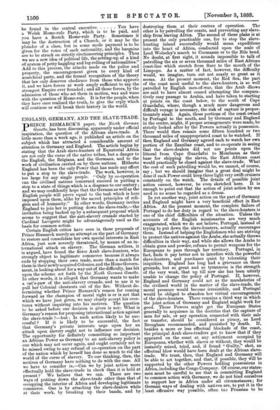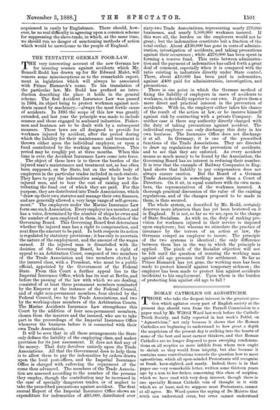ENGLAND, GERMANY, AND THE SLAVE-TRADE P RINCE BISMARCK'S paper, the North
German Gazette, has been discussing, apparently under official inspiration, the question of the African slave-trade. A little more than a week ago, it published an article on the subject which has attracted a considerable amount of attention in Germany and England. The article begins by stating that the Arab slave-hunters of Equatorial Africa are not only the curse of the native tribes, but a danger to the English, the Belgians, and the Germans, and to the work of civilisation carried on by those nations. Hitherto England has been the only Power that has made any effort to put a stop to the slave-trade. The work, however, is too large for any single people. " Only by co-operation can the civilised nations concerned succeed in putting a stop to a state of things which is a disgrace to our cen and we may confidently hope that the German as well as the English people will prove equal to the task which is here imposed upon them, alike by the sacred principles of reli- gion and of humanity." In other words, Germany invites England to join her in putting down the slave-trade,—the invitation being backed up by a subsequent proposal which seems to suggest that the anti-slavery crusade started by Cardinal Lavigerie might be advantageously used as the basis for common action.
Certain English critics have seen in these proposals of Prince Bismarck merely an attempt on the part of Germany to restore and consolidate her own special interests in East Africa, just now severely threatened, by means of an in- ternational attack on slavery. The German settlers, it is argued, have found the fierce Arab slave-hunters, who strongly object to legitimate commerce because it always ends by stopping their own trade, more than a match for them in their newly acquired Colonies, and the Home Govern- ment, in looking about for a way out of the difficulty, has hit upon the scheme set forth by the North German Gazette. In other words, it is alleged that Germany wants to make a cat's-paw of the anti-slavery crusade, and to use it to pull her Colonial chestnuts out of the fire. Without de- termining whether Prince Bismarck's reason for coming forward as the champion of moral right is or is not that which we have just given, we may clearly accept his over- tures without inquiring into his motives. The question to be asked before our decision is given is not: What is Germany's reason for proposing international action against the slave-trade P—but : Is such action likely to be suc- cessful ? If it is likely to be successful, the fact that Germany's private interests urge upon her an attack upon slavery ought not to influence our decision. The opportunity for definitely committing so important an African Power as Germany to an anti-slavery policy is one which may not occur again, and ought certainly not to be missed owing to any refusal of co-operation on the part of the nation which by herself has done so much to rid the world of the curse of slavery. To our thinking, then, the motives of Germany have nothing to do with the case. All we have to consider is,—Can we by joint action more effectually hold the slave-trade in check than it is held at present F We believe that we can. There are two ways of putting down the slave-trade other than that of occupying the interior of Africa and developing legitimate commerce. One is by attacking the slave-dealers while at their work, by breaking up their bands, and by destroying them at their centres of operation. The other is by patrolling the coasts, and preventing any slave- ship from leaving Africa. The second of these plans is at present the only practicable one, for to stop the slave- hunting inland successfully would mean expeditions into the heart of Africa, conducted upon the scale of Lord Wolseley's march to Coomassie or to the Nile bend. No doubt, at first sight, it sounds impossible to talk of patrolling the six or seven thousand miles of East African coast-line which stretch from Suez to the mouth of the Limpopo. As a matter of fact, however, the difficulty would, we imagine, turn out not nearly so great as it seems. At the present moment, the Red Sea, the part of the coast most useful to the slave-hunters, is so well patrolled by English men-of-war, that the Arab dhows are said to have almost ceased attempting the compara- tively easy passage to Arabia, and have taken to starting at points on the coast below, to the south of Cape Guardafui, where, though a much more dangerous and difficult voyage is necessary, the risk of capture is propor- tionately small. Again, those portions of the coast owned by Portugal to the south, and by Germany and England in the centre, might, if proper arrangements were made, be strictly looked after by the Powers actually in possession. There would then remain some fifteen hundred or two thousand miles of unappropriated coast to be watched. If then England and Germany agreed each to watch her own portion of the Zanzibar coast, and to co-operate in seeing that the slave-dealers did not use points upon the littoral from Cape Guardafui to Mombassa as their base for shipping the slaves, the East African coast would practically be closed against the slave-trade. What the cost of such patrolling would be, we cannot, of course, say ; but we should imagine that a great deal might be done if each Power could keep three light very swift cruisers constantly on the watch. The details of possibleoint action cannot, however, be even sketched here. It is enough to point out that the notion of joint action by sea need in no sense be regarded as a dream. In yet another way, joint action on the part of Germany and England might have a very beneficial effect in East Africa. At the present moment, the complete failure of Portugal to do her duty in regard to the slave-hunters is one of the chief difficulties of the situation. Unless the accounts of the English missionaries are very much exaggerated, which we do not believe, Portugal, instead of trying to put down the slave-hunters, actually encourages them. Instead of helping the Englishmen who are striving to protect the natives against the Arabs, she actually throws difficulties in their way, and while she allows the Arabs to obtain guns and powder, refuses to permit weapons for the Europeans to pass through her territory. Portugal, in fact, finds it pay better not to interfere with the powerful slave-hunters, and purchases quiet by tolerating their iniquities. England has long had a grievance on these grounds, but so great and so tyrannous is the strength of the very weak, that up till now she has been utterly unable to change the policy of Portugal. If, however, England and Germany could act as the mandatories of the civilised world in the matter of the slave-trade, the moral pressure would become irresistible, and Portugal would be obliged to abandon her virtual encouragement of the slave-hunters. There remains a third way in which the joint action of Germany and England might work for good. Those Powers might get the European States generally to acquiesce in the doctrine that the capture of men for sale, or any operation connected with their sale or transfer, should be considered as piracy, as Lord Brougham recommended, and punished by death. If, besides a more or less effectual blockade of the coast, the principal Arab slave-traders got to know that if they appeared on the coast at any settlement occupied by Europeans, whether with slaves or without, they would be instantly seized, tried, and, if found " Guilty,' shot, an effectual blow would have been dealt at the African slave- trade. We trust, then, that England and Germany will be able to act together, and that, if possible, they will be supported by the other Powers holding possessions in Africa, including the Congo Company. Of course, our states- men must be careful to see that in committing England to common action with Germany, we do not bind ourselves to support her in Africa under all circumstances ; for German ways of dealing with natives are, to put it in the least offensive way possible, often too Prussian to be acquiesced in easily by Englishmen. There should, how- ever, be no real difficulty in agreeing upon a common scheme for suppressing the slave-trade, in which, at the same time, we should run no danger of sanctioning methods of action which would be unwelcome to the people of England.



















































 Previous page
Previous page